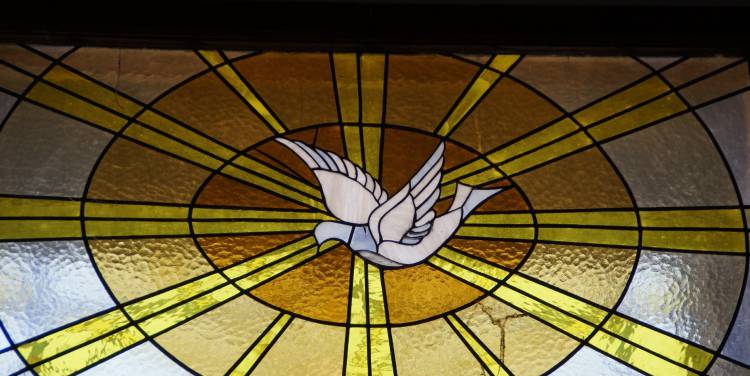The Spirit of the Lord is on me,
because He has anointed me
to preach good news to the poor;
He has sent me
to proclaim freedom for the prisoners
and recovery of sight for the blind
to release the oppressed
to proclaim the year of the Lord’s favour
(Luke 4:18-19).
That is what Jesus read in the synagogue at Nazareth. Jesus had remained at home till He was thirty years old. After briefly asserting His identity as God’s son, Jesus went back to Jerusalem to learn carpentry from Joseph, and when Joseph died Jesus became known as the Carpenter of Nazareth (Mark 6:3). Jesus stayed to look after the carpenter’s shop until His younger brothers were old enough to look after His mother. So at the age of thirty, He set out to find the wild prophet John the Baptist.
John reluctantly baptised Him. The Holy Spirit took possession of Him and He withdrew into the desert. There He had a war with the devil and triumphed over His enemy. Jesus began to preach in the towns of Galilee. The news about Him spread. Eventually He came back to Nazareth, and on the Sabbath He stood up in the synagogue and read the prophecy of Isaiah (61: 1-2). Having read it He quietly announced, “This prophecy is fulfilled today” (Luke 4:21).
When people today read the words that Jesus read, they skip the first part and focus on the last part of what He read:
- Preach good news to the poor
- Proclaim freedom to prisoners
- Command healing for the blind
- Liberate the oppressed
- Proclaim the arrival of God’s redemption
In the last part there is action, and we are a generation that favours activism. However, the subject of our Lord’s reading is the Holy Spirit Himself, not the activity that occurs as a result of the Spirit’s anointing. It was His relationship with the Spirit that was the main issue. The forms of ministry were only incidental to the Spirit’s presence.
In the Bible, the word ‘spirit’ is not one that refers to some abstract quality, but to an entity or being. The word stands not for a power but a Person.
THE SPIRIT AS ENTITY
People talk of the “Christmas spirit” or of a person being in “good spirits” or of the spirit that is hard liquor. These modern usages tend to make many think that the Holy Spirit is an abstract quality or power. They think that all talk of God’s Spirit is just a way of referring to the power of God. In the Bible, the word ‘spirit’ is not one that refers to some abstract quality, but to an entity or being. The word stands not for a power but a Person.
In fact, Jesus made a distinction between the Spirit and power. He said to the disciples, “You shall receive power after the Holy Spirit has come upon you” (Acts 1:8). It is important to note that Jesus was not saying, “The power of the Lord is upon Me”, but “the Spirit of the Lord is upon Me”.
One of the words that Jesus used to describe the Holy Spirit is the Greek word paraclete (John 14:16, 26; 15:26; 16:7). This word is formed by two Greek words—para meaning ‘beside’ and kaleo meaning ‘call’. The word translates ‘advocate’. A paraclete or advocate is one whom we call to stand beside us in court. If the Spirit is some abstract quality of God, we would have no advocate to defend our cause in the courts of the world.
Imagine making a court appearance and counting on asking the judiciary or the jury to get into the right frame of mind so that justice will be done. No defendant would depend on the moods of the people in a court of law. He engages an advocate. That is how Jesus described the Holy Spirit. He is the Paraclete (the Advocate) in the life of Christians.
Christ referred to the Spirit as “another Paraclete” (14:16). The qualifying word “another” suggests that the Spirit has similarity to Christ that allows Him to take the place of Christ in the life of the believer, and also distinctness or “anotherness” from Christ Himself. It suggests that Christ was the Paraclete in the life of the disciples during Christ’s incarnation, and that the Spirit would replace Him afterwards. In these Johannine passages, Christ’s specific teaching is that the Holy Spirit will substitute for Christ in the present.
Of course, Jesus Himself does not cease to be our Paraclete. He continues to serve as our Advocate in heaven. Satan accuses us before God (Rev 12:10), but “we have an Advocate who speaks to the Father in our defence—Jesus Christ the Righteous” (1 John 2:1). He is interceding for us all the time (Rom 8:34; Heb 7:25).
Jesus lets us know in no uncertain terms that the Holy Spirit is His equal in every way—neither lesser, nor greater.
Further evidence that Jesus is talking about the person of God is His warning that blasphemy against the Holy Spirit is unforgivable (Matt 12:31-32).
The Spirit who comes into the lives of the followers of Christ is a person with whom we can enjoy a personal relationship. He comes into our lives with all His personal resources, and His power becomes ours. We incarnate the Spirit of Christ for our world today. That is why the Church is called the ‘Body of Christ’. It is His ‘reincarnation’. Without the Church, Christ has no hands to touch the world or lips to proclaim the gospel of love and peace.
THE SPIRIT AS ENERGISER
It is significant that Jesus did not simply say at Nazareth: “I have come to preach and heal”. He said that the Spirit is the one who enabled Him. He clearly implied that without the Spirit’s anointing, He could not fulfil His mission. Jesus did no miracles before the Holy Spirit came on Him, because He could do none. In saying that, there is no denial of His divinity. When Christ was incarnate, He was fully human. He became the Son of Man totally. His divinity gave Him no super-human power or protection. He became human like us. He was a man—just a man with no extra power until the Holy Spirit came.
When the Holy Spirit comes into a life, there comes a sense of satisfaction.
There are apocryphal stories of Jesus in his boyhood being able to breathe life into clay birds and turning His friends into chickens because their mother hid them under a large basket and said that there were only chickens there. Such stories turn Jesus into a monster and do not in any way bear out Christ’s incarnation. He did not perform miracles according to His whim. Only under the anointing of the Holy Spirit was He enabled to perform miracles.
Just as Jesus viewed the Holy Spirit as the source of all His power, He taught His disciples that the Spirit would be their helper in trouble and their enabler in ministry. When on trial for their faith, the disciples of Jesus Christ need have no fear, because they would not be the ones to answer charges against them, but the Holy Spirit would be speaking on their behalf through them (Mark 13:11). And for their regular work and mission, the Spirit would be with them constantly to enable them. Christ charged His disciples not to start their work until the Holy Spirit came on them in power (Luke 24:49; Acts 1:4).
THE SPIRIT’S EFFECTS
Enabled by the Spirit of God, Jesus was able to preach the Gospel, make the lame walk, open the eyes of the blind, heal the sick and raise the dead. The presence of the Spirit was not just a spiritual experience; there was concrete evidence in the life of Jesus. In a similar way, the presence of the Spirit in the life of a Christian has tangibility.
Christ’s most elaborate teaching on the Holy Spirit’s effects in the life of the individual believer and in society at large is recorded in the Gospel According to John.
First, Jesus said that the new birth is a work of the Spirit (3:6), and being born of the Spirit is essential to gain entry into God’s kingdom (v.5). Spiritual rebirth is not a case of human planning or effort. When people receive Jesus as Lord, they are given the right to become children of God. They cannot become God’s children through scheming or by manipulations (1:12-13). “That which is born of the flesh is flesh. That which is born of the Spirit is spirit” (3:6).
When the Holy Spirit comes into a life, there comes a sense of satisfaction. The heart’s deepest longings are fulfilled and the real thirst of one’s life is quenched. So Jesus described the Spirit as a spring of water that keeps bubbling and refreshing a dry and thirsty land (7:38-39; 4:14). The satisfaction that the Spirit gives is what is essential in life, not the things of the flesh (6:63).
All these passages link the Holy Spirit’s presence in the life of the believer with the new birth. No one can be a believer in Christ and not have the Holy Spirit (Rom 8:9).
A believer acknowledges Jesus and submits to His lordship. That is a confession of faith inspired by the Holy Spirit. “No one can say ‘Jesus is Lord’ except by the Holy Spirit” (1 Cor 12:3). The believer is one who acknowledges Christ in his or her life, receives the Holy Spirit and experiences the new birth.
Jesus also said that the Holy Spirit would bring divine power into the life of the believer. He promised that believers will do greater works than what He had done (14:12), because whatever they would pray for on behalf of Jesus, the Father would do (vv.13-14), and Christ Himself will send the Paraclete to be with them and to strengthen them (v.16) when they love Him and are obedient to Him (v.15). The world desperately needs to see that Jesus is really alive today. It needs to see proof− God validating the preaching of the gospel (Heb 2:4).
The vast majority of the world’s population is yet to be brought under the conviction of the Holy Spirit’s view of sin, righteousness and judgement (John 16:8-11) because many Christians have not yet given a credible demonstration of His presence in their lives.






